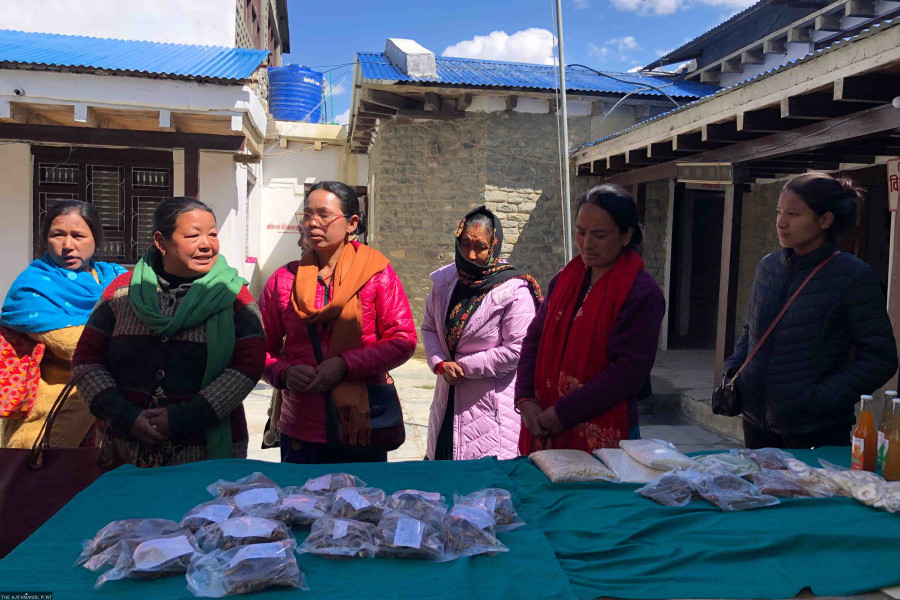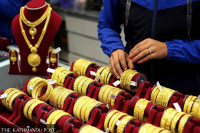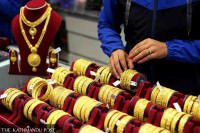Money
Women entrepreneurs in Mustang in need of digital marketing skills
Digital marketing is much more than just posting photos and videos on social media, an expert says.
Deepak Pariyar
Women in Mustang run homestays, produce apple and apricot juice and dried chips, buckwheat and nettle flour, and apple candies among other organic products. But, the most they have ever done to promote their business online is posting the photos and videos on social media platforms such as Facebook and Tik Tok.
Kamala Lalchan is among such entrepreneurs, who runs a factory producing apple and apricot juice.
Lachlan, also the chairperson of Bjongmore Small Farmer Agriculture Co-operative at Marpha in Gharapjhong Rural Municipality, Mustang, posts such photos once in a while and urges members to do the same.
Most of the members in the agriculture co-operative are women, who work in groups of 5 to 10 to produce such products.
But the products have remained largely unknown outside the district due to poor marketing.
The entrepreneurs believe that digital marketing can become a game changer for the exposure of Mustang’s product to national and international markets. Lately, they have been more keen towards learning such skills.
“Though women entrepreneurs from our group sometimes share their products on Facebook and Tik Tok, most of us do not know how to market the products digitally,” said Lalchan.
Juma Thakali, proprietor of the Thakali Community Homestay at Thini village in the rural municipality, shared the same story. But a Facebook page has helped her get more visitors.
“Earlier, we only had a visiting card and a brochure of the homestay,” said Thakali. “But, lately we have been getting visitors who say they knew about us through the Facebook page.”
Thakali often promotes local cuisine, culture, and scenic beauty of her locality on Tik Tok.
There is also a women’s entrepreneurs group, consisting of 14 members, in Thini which makes Jhilinga, a traditional Nepali food, from buckwheat flour.
The rural municipality has provided the group with four machines to produce it at a 90 percent subsidy.
Around eight months ago, the rural municipality had provided training to local women to make Jhilinga.
According to Syamu Thakali, secretary of the group, 120 pieces of Jhilinga can be made from around four kg of buckwheat flour.
Jhilinga is sold from outlets in and around Jomsom and Marpha.
“The sales are more during the festivals,” said Thakali. “We plan to increase its production and focus on marketing in the coming days.”
“Selling the products door to door is often time consuming,” said Meena Thakali, a member of the group, at a digital marketing training programme organised in Jomsom last Thursday.
The Tourism Entrepreneurs Women Association of Nepal (TEWAN) had organised the programme with assistance from the Ministry of Industry, Tourism, Forest and Environment of Gandaki Province and Gharapjhong Rural Municipality.
Jamuna Thapa, the vice chair of the rural municipality, is herself an entrepreneur.
Thapa teamed up with Bitti Thakali and Laxmi Thakali to produce candies from apples.
The group, which started production around three months ago, have been excited by the sales.
“We have been able to sell all the candies we made in the first phase,” said Bitti. “We plan to produce more in the coming season and sell it in Kathmandu and Pokhara as well.”
Though the women entrepreneurs have utilised social media to promote their businesses to some extent, the authorities concerned need to impart them with more effective marketing skills, according to Ujwal Poudel, a software engineer at Pokhara-based Aankhijhyal Technologies, an information and technology consulting firm.
“Digital marketing is much more than just posting photos and videos on social media,” said Poudel, who provided the training last week. “Businesses should create innovative content on the basis of market demand and social media trends.”
Women entrepreneurs were informed about tourism promotion on various social media platforms, search engine marketing, email marketing and selling the products through an online medium during the training programme.
Kamala Giri, president of TEWAN, said branding of Mustang’s products along with digital marketing skills will help entrepreneurs in the district, most of whom are women.
“Visitors to the area have been the main customers of Mustang products,” said Giri. “Effective digital marketing will expand the market.”
Maya Gurung, the chief of the District Coordination Committee, Mustang, said that organic products of the district have remained confined within the district because of poor marketing.




 12.17°C Kathmandu
12.17°C Kathmandu.jpg)















